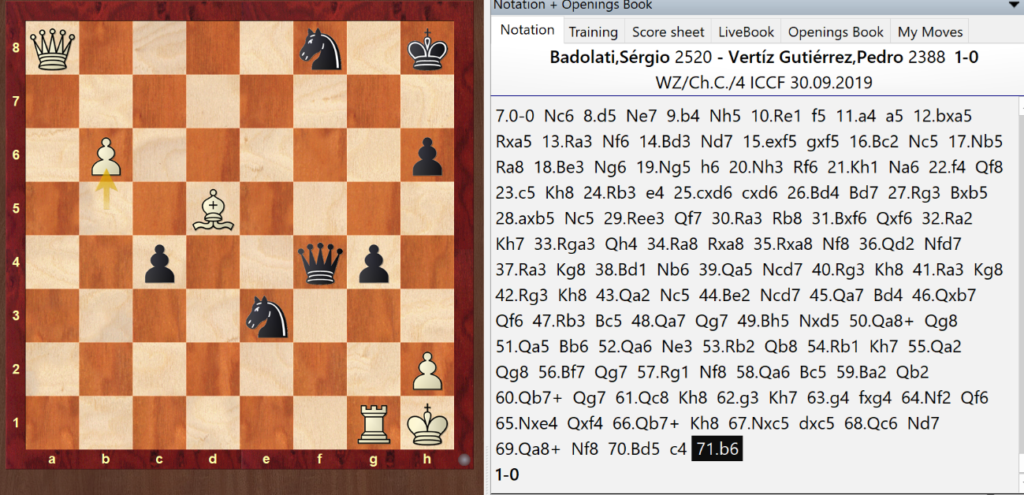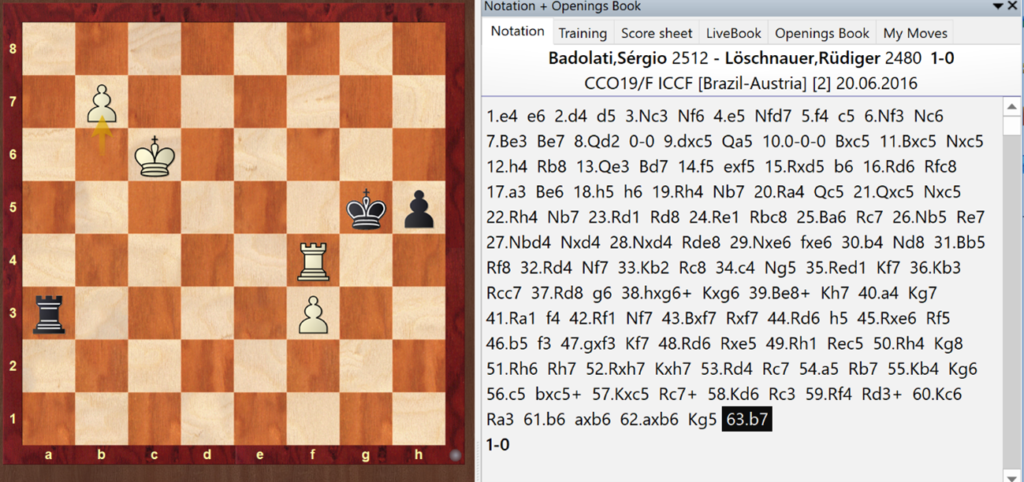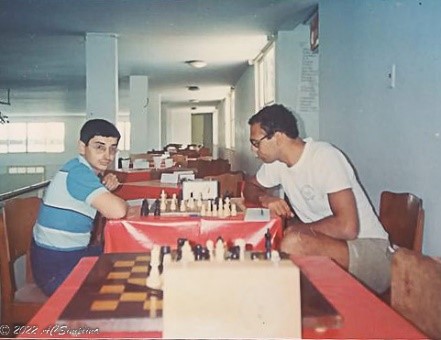ICCF Titles: IM 2007, SIM 2009, GM 2010, Rating: 2443
Our featured player of the World Zone for today is GM Sergio Badolati (ICCF 71079) of Brazil. For this write-up I was thinking on how to proceed on the next selection of the featured player. It came to my mind that perhaps a player from Latin America will be a good subject and this time I thought that a player from Brazil will be a good choice. So I asked Señor Bianor de Oliveira Neves, the National Delegate of Brazil for his recommendation and he wholeheartedly endorsed GM Sergio Badolati.
Sergio has a very interesting life experiences and he has shared his thoughts about chess, his accomplishments, his beginnings and progress in correspondence chess on his way to achieving the highest title of Grandmaster. He has been playing correspondence chess for almost 20 years now and he has some words that he is imparting to the new players on how to improve in correspondence chess.
Contributed by:
Arthur Simplina
Philippine Correspondence Chess Association
September 19,2022
Here are his responses to the questionnaire:
Please provide your name, age and please add your family information, education, work experience, etc. and anything you can think of that describes your life experiences.
A: My name is Sérgio Luis Badolati Rodrigues, in chess I’m known as Sérgio Badolati. I am 61 years old, and I was born in Miguel Pereira, a small tourist town in the interior of the State of Rio de Janeiro on July 24, 1961. I come from a humble family and my father, of African descent, was a Military Police State of Rio de Janeiro, now 93 years old. My mother, of Italian descent, always took care of the household chores, and helped with schoolwork, the so-called “homework”. She is 92 years old. I have a sister, a Nurse, with a Postgraduate Degree in Occupational Nursing. I’m single, I don’t have children. I worked for 30 (thirty) years in the Civil Police of the State of Rio de Janeiro, with criminal investigation. Today, retired from the Secretary of Public Security. I have a bachelor’s degree in law with a postgraduate degree in criminal expertise. I like, in addition to chess, doing aerobic physical activity (walking and running), listening to music and I’m also interested in reading the most varied. I recently finished reading “Slavery volume II”, whose author is the Brazilian historian Laurentino Gomes. I started reading the 1st (first) book series of 5 (five) books written by the former World Chess Champion, Garry Kasparov, whose title is “My Great Predecessors”.
Historical Background Relating to Chess – Most chess players learn early to play chess by watching their father or family member play chess. How did you start learning and playing chess? How was your initial chess training?
A: As for my learning in chess, the movements of the pieces, it was with school friends here in Miguel Pereira, when I was attending primary school at Colégio Estadual Dr. Antônio Fernandes, still a teenager, in 1973. I remember that we used to play games during class breaks. I didn’t have the slightest bit of theoretical knowledge and the moves were played intuitively. That year, the Interzonal Chess Tournament took place in Petrópolis, won by the Brazilian GM Henrique Mecking (Mequinho), which influenced thousands of young people to practice chess, including me. After primary school, I didn’t play for a while, because I went to high school in the city of Rio de Janeiro, at Colégio Piedade. Soon after finishing high school, I returned to my hometown and met the person who was responsible for my evolution in chess, Antônio Lameiras, a gentleman of Portuguese nationality who had been a member of the chess club in the city of Porto, in Portugal. Lameiras lent me two books, Modern Chess Strategy by Ludek Pachman and Basic Chess by Orfeu Gilberto D’Agostini. While I “devoured” the books chapter by chapter, Lameiras prepared situations on the chessboard, always emphasizing the “ends” of the game for me to solve. That’s when I started to understand the need to know, in greater depth, this phase of the game. We were already in the beginning of the 80s. In 1984, the dispute for the World Chess Title between Karpov and Kasparov takes place, which became known as “The Unfinished Symphony”, and I remember that there was a chess column in the extinct Jornal do Brasil, in the “B” section, which published the commented World Cup matches. I played them. And so my interest in the noble art of Caissa was consolidated.
Who is the chess player in the past that has influenced you the most and why?
A: I can’t name just one player as several influenced me to continue playing chess. I mention 3 (three), who had the most influence on my continuity in chess, brilliant, spectacular players, the first two were World Champions. The North American GM Bobby Fischer, for many the greatest/best player of all time, the Russian GM Garry Kasparov, the first player in the world to surpass the 2800 Fide rating barrier and the Brazilian GM Henrique Mecking, known in the chess circle as Mequinho, who was also very important for me to continue studying chess. He was the only Brazilian GM to reach 3rd place in the Fide ranking. I can say that all three have influenced millions of people in the world to play chess, including me.
Please provide any relevant information about your chess experiences and achievements prior to your participation in ICCF Correspondence Chess.
A: Well, in 1985, I organize what was considered the 1st Miguel Pereira/RJ Chess Championship. I continued to lead the organization of this event for 25 years. I had the honor and satisfaction of winning the title of “Municipal Champion of Miguel Pereira” three times, in 1989, 1990 and 2008. This event, the Miguel Pereira/RJ Chess Championship, was recognized by the Federation of Chess of the State of Rio de Janeiro in 1991.
In 1991, playing the State Interclubes Class “B”, organized by FEXEJ, by Miguel Pereira Atlético Clube, in the first year we were in 2nd place, winning the runner-up.
In 1993, I played in the Final of the State Championship in Rio de Janeiro, placing 8th, an event on the FEXERJ calendar.
In 2018, I joined the Fluminense Futebol Clube team, General Champion of the Interclubes State Championship. Official event organized by the Rio de Janeiro State Chess Federation.
As an event organizer, there are a few more that I would like to highlight, such as the 3rd Magistral Championship of the Interior in partnership with FEXERJ, from August 13 to 21, 1994, an event worth FIDE rating. The Final of the 70th Brazilian Absolute Chess Championship (2003), event (FIDE), whose champion was GM Darcy Lima. The Final of the Brazilian Women’s Chess Championship (2003), FIDE event, whose champion was WMI Regina Ribeiro.
During the period in which I organized the Municipal Championship of Miguel Pereira, I took to the city to play simultaneously, some titled and renowned players in Brazilian and international chess such as the Bi-Brazilian Absolute Champion, MI Alexandru Sorin Segal, in 1988 (in memoriam). The International Master, MI Eduardo Arruda in 1993 (in memoriam). The International Master Eduardo Thelio Limp, in 2001. The International Master Diego Rafael Di Berardino, in 2002. The Fide Master Ricardo Teixeira in 2003 (in memoriam). Master Fide, Sadi Dumont, among others.
Correspondence Chess
From your personal experience, how did it all started?
Please record your ICCF experience – your memorable games and tournaments have participated as you ascend and progress from IM, SIM and now GM. We can present a memorable game if you want (just send me the PGN file and I can set it up) and include it in the description.
A: Over time, in 2003, through CXEB (Clube de Xadrez Epistolar Brasileiro) I discovered the ICCF website and started playing the events.
– In 2006, I obtain the 1st norm of MI ICCF (International Master Chess Correspondence), finishing in 4th place in the CAD/C19/sf02 CADAP Championship 19 email Semifinal 2, event category 3, with 10.5 pts.
– In 2007, I got 1st place on the PanAm/TC9 Board 2, 9th Panamerican Team Championship Board, category 5 event, with 11.5 pts out of 15 possible, which earned me the achievement of the 1st ICCF SIM standard and the definitive title of MI ICCF (Master International Chess Correspondence). Detail, I had the best performance on the first board!
– In 2009, I got the 2nd place in the CADAP-40/A – group A, category 14 event, with 8 pts out of 12 possible, which earned me the achievement of the 2nd norm of SIM ICCF and consequently the definitive title of SIM ICCF ( Master International Senior Chess Correspondence) and the 1st norm of GM ICCF (Grand Master Chess Correspondence).
– 2009, I get 4th place in CAD/C19/final, CADAP XIX Zonal Final Stage, category 11 event, with 10.5 pts out of 16 possible, which earned me the achievement of the 2nd GM ICCF standard and consequently the definitive title of GM ICCF (Grand Master Chess Correspondence).
– In the CAD/C20/final, CADAP XX Zonal Final Stage, 2010, Category 11 event, I got the 3rd place, with 10.0 pts and consequently, at the time, the right to play WCCC Final, (World Chess Championship Final by Correspondence).
– In 2011, I play WC27/Final, World Championship 27 Final, category 14 event and finish in 8th place with 7.5 pts out of 16 possible, drawing 15 matches and losing only to the strong German player Thomas Mahling.
– In 2012, I play the CT15/final, World Cup XV Final, category 10 event and I finish in 8th place with 7 pts out of 14 possible, winning 3 matches, drawing 8 and losing 3. A curiosity was my victory over the strong player Crota GM Leonardo Ljubicic, 2639 ICCF rating at the time and that in 2013 he would win the title of CHAMPION of the 28th World Championship.
– In 2016, I got 3rd place in the RUS/Winter 2016, Russian Winter 2016 – Russia GrandMaster, category 11 event, with 7.5 pts out of 14 possible.
– In 2016, I got 1st place in the CCO19/F Board 2, ICCF Olimpíad 19 Final Board 2, category 10 event, with 7 pts out of 12 possible (2 wins and 10 draws).
– In 2019, I got 1st place in WZ/Ch.C./4, WZ Individual Championship Candidates Group 4, Category 7 event, with 8 pts out of 14 possible (2 wins and 12 draws).
– In 2021, I got 9th place in ICCF-70 CT pr s/03, 70th ICCF Jubilee World Cup (server) pr section 3, out of 61 players, with 7.5 pts (4 wins, 7 draws and 1 loss). In detail, I qualified for the Final Phase of the ICCF Jubilee World Cup Final which will start next November. According to information from the President of the CXEB, Richard Fuzishawa, I am the only representative of Latin America!
Who are your favorite match players and can you give your personal reasons for your choice?
From your experience, how do you compare correspondence chess now (using chess engines) and before? Please let me know your thoughts on using chess engines in ICCF correspondence chess. Many believe that engines “killed” correspondence chess. Your thoughts on the future of correspondence chess.
A: Well, talking about my favorite players in the ICCF, I mention the Russian GM Aleksandr Surenovich Dronov (2649) who has been playing at a very high level for 27 years and having won the World Championship for 3 (three) times. He was also the best board at the 20th ICCF Chess Olympiad, Board 1, ICCF Olympiad 20 Final!!! It’s no easy task to stay motivated for so long to achieve such results. Another player that I admire a lot is the Dutch GM Ron Langeveld, World Champion on two occasions!!! Undoubtedly, there are many other very strong ICCF players I could name, but these are my favorites.
In 2023, God willing, I will complete 20 (twenty) years of CXEB/ICCF. It seems little compared to other players who have been playing for longer than I have, but on further reflection, it’s a lot of time. Twenty (20) uninterrupted years dedicated to postal chess, always looking to improve, even in adversity. During this period I was able to follow the evolution of chess engines/engines. It is a reality and we must not ignore it because I also use it. Technological advances, with the use of increasingly powerful software, obviously made many games more and more balanced, but, in my humble view, just having a good program (chess software) is no use. I understand, always respecting opposing currents of thought, that it is also necessary to know, with some depth, each phase of the game (openings, midgame and finals), in order to obtain success in postal chess. If, at some point in my trajectory in postal chess, I was afraid of engines/engines, I would have stopped playing by now. What moves me, inspires me, is the passion for chess, for research aimed at discovering “theoretical novelties”. Of course, I have “goals and objectives” to be achieved and that motivates me. A goal accomplished was reaching a World Cup Final again. Now, with more experience, it’s fighting for the objective of winning the title, respecting all opponents who will be trying the same as me. The other goal to reach, which is further away, is to finish between the top two in WCCC46SF (World CC Championship 46 Semi-Final), which, if it happens, will qualify me to play in a WCCC Candidates (World CC Championship Candidates) bracket.
Overall, what are your personal thoughts on the benefits of correspondence chess for you, as well as meeting a lot of people around the world – face to face and online. Has correspondence chess made your life more meaningful and improved your mental faculties?
A: Well, about the benefits of postal chess, I would like to mention that through the work of persecution through research, investigation, aiming at the discovery of new “moves”, the so-called “theoretical novelties”, I understand that, in a way, there was a strengthening in resilience, in my ability to discover, resist and overcome everyday problems. There are numerous other benefits such as increased ability to maintain concentration, training in critical thinking, increased discipline, improved power of analysis of consequences, improved decision making, learning from mistakes, among others.
Lastly – any personal advice you can give new players on how they can improve and become a better correspondence chess player.
A: To young people who are starting their careers in correspondence chess, who have dreams and aim for growth, I leave the following suggestions:
1- Try to understand what you are looking for? What are your intentions and playing Correspondence Chess?
2- Establish goals and objectives.
3- Choose your National Federation or ICCF events according to your interest, following the strategically designed planning.
4- Understand that in correspondence chess everything is part of a process and that growth may not occur according to the initially planned time.
5- Read the ICCF rules for each competition.
6- Acquire a good Chess Software (engine).
7- Acquire an ECO program (Encyclopaedia of Chess Opening) – Database.
8- Acquire an updated program, a database of chess games (live and by correspondence).
9- Have persistence / tenacity.
10- Good luck and success to all!
Memorable Games
9th Pan American Team Championship Board 2.
Sérgio Badolati (2459) X SIM Horacio Daniel Rocca (2467)
1.d4 Nf6 2.c4 g6 3.Nc3 d5 4.Nf3 Bg7 5.Qb3 dxc4 6.Qxc4 0–0 7.e4 a6 8.e5 b5 9.Qb3 Nfd7 10.h4 c5 11.e6 c4 12.exf7+ Kxf7 13.Qd1 e5 14.d5 h6 15.Be3 e4 16.Nxe4 Nb6 17.h5 Bf5 18.hxg6 Kd7 19.Ng3 Nxd5 20.Bxh6 Qe7+ 21.Be2 Bxg6 22.Bxg7 Qxg7 23.Nh4 Nc6 24.Nxg6 Qxg6 25.Qd2 Ncb4 26.0–0 Kf8 27.Rae1 Qg7 28.a3 Nc6 29.Nh5 Qg6 30.Bd1 Kd6 31.Qe2 Kf5 32.Qe4 Nde7 33.Ng3 Kd4 34.Qc2 Kf7 35.Ke4 Kf4 36.Kxf4 Kxf4 37.Qc1 Kh4 38.Qe3 Qh6 39.Qc5 Qf4 40.Qb6 Qe5 41.Qxa6 Kf7 42.a4 bxa4 43.Bxa4 Nb4 44.Qa8 Nbd5 45.Qe8+ Kg7 46.Bd1 Kf6 47.Nh5+ Ke6 48.g3 Ke4 49.Bf3 Re1 50. Ng7+ Kd6 51.Kxe1 Qxe1+ 52.Kg2 Qb4 53.Nf5+ Nxf5 54.Qd8+ Ke6 55.Qxd5+ Kf6 56.Bg4 Nd6 57.Qd4+ Ke7 58.Qg7+ Ke8 59.Bd7+ Kd8 60.Be6 Qb5 61.Qf8+ Nef8 62. Bf7
1-0

WZ Individual Championship Candidates Group 4
GM Sérgio Badolati (2520) X CCM Pedro Vertiz Gutierrez (2388)
1.d4 Nf6 2.c4 g6 3.Nc3 Bg7 4.e4 d6 5.Nf3 0–0 6.Be2 e5 7.0–0 Nc6 8.d5 Ne7 9.b4 Nh5 10.Ke1 f5 11.a4 a5 12.bxa5 Kxa5 13.Ka3 Nf6 14.Bd3 Nd7 15.exf5 gxf5 16.Bc2 Nc5 17.Nb5 Ra8 18.Be3 Ng6 19.Ng5 h6 20.Nh3 Kf6 21.Kh1 Na6 22.f4 Qf8 23.c5 Kh8 24.Kb3 e4 25. cxd6 cxd6 26.Bd4 Bd7 27.Kg3 Bxb5 28.axb5 Nc5 29.Ree3 Qf7 30.Ka3 Kb8 31.Bxf6 Qxf6 32.Ka2 Kh7 33.Kga3 Qh4 34.Ka8 Kxa8 35.Kxa8 Nf8 36.Qd2 Nfd7 37.Ra3 Kg8 38.Bd1 Nb6 39.Qa5 Ncd7 40.Kg3 Kh8 41.Ra3 Kg8 42.Kg3 Kh8 43.Qa2 Nc5 44.Be2 Ncd7 45.Qa7 Bd4 46.Qxb7 Qf6 47.Kb3 Bc5 48.Qa7 Qg7 49.Bh5 Nxd5 50. Qa8+ Qg8 51.Qa5 Bb6 52.Qa6 Ne3 53.Kb2 Qb8 54.Kb1 Kh7 55.Qa2 Qg8 56.Bf7 Qg7 57.Kg1 Nf8 58.Qa6 Bc5 59.Ba2 Qb2 60.Qb7+ Qg7 61.Qc8 Kh8 62.g3 Kh7 63.g4 fxg4 64.Nf2 Qf6 65.Nxe4 Qxf4 66.Qb7+ Kh8 67.Nxc5 dxc5 68.Qc6 Nd7 69.Qa8+ Nf8 70.Bd5 c4 71.b6
1-0

ICCF Olympiad 19 Final Board 2
GM Sérgio Badolati (2512) X SIM Rüdiger Löschnauer (2480)
1.e4 e6 2.d4 d5 3.Nc3 Nf6 4.e5 Nfd7 5.f4 c5 6.Nf3 Nc6 7.Be3 Be7 8.Qd2 0–0 9.dxc5 Qa5 10.0–0–0 Bxc5 11.Bxc5 Nxc5 12. h4 Kb8 13.Qe3 Bd7 14.f5 exf5 15.Kxd5 b6 16.Kd6 Kfc8 17.a3 Be6 18.h5 h6 19.Kh4 Nb7 20.Ka4 Qc5 21.Qxc5 Nxc5 22.Rh4 Nb7 23.Kd1 Kd8 24.Ke1 Kbc8 25.Ba6 Kc7 26.Nb5 Ke7 27.Nbd4 Nxd4 28.Nxd4 Kde8 29.Nxe6 fxe6 30.b4 Nd8 31.Bb5 Kf8 32.Kd4 Nf7 33.Kb2 Kc8 34.c4 Ng5 35.Red1 Kf7 36.Kb3 Kcc7 37. Kd8 g6 38.hxg6+ Kxg6 39.Be8+ Kh7 40.a4 Kg7 41.Ka1 f4 42.Kf1 Nf7 43.Bxf7 Kxf7 44.Kd6 h5 45.Kxe6 Kf5 46.b5 f3 47.gxf3 Kf7 48.Kd6 Kxe5 49.Kh1 Rec5 62 axb6 Kg5 63.b7
1-0


0 Comments Leave a comment